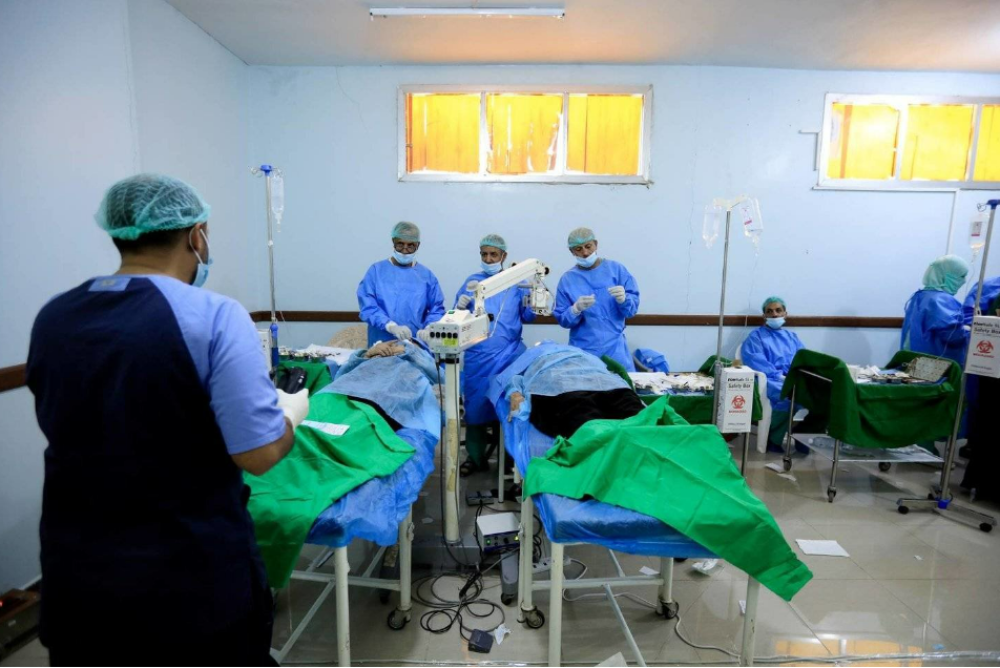Measles Cases Spread Across Houthi-Ruled Areas


UN reports revealed a 260 percent increase in measles cases in Yemen, with the majority recorded in areas under Houthi control. This coincides with the widening spread of famine, as well as the deterioration of health and education sectors.
As the legitimate Yemeni government, based in the temporary capital of Aden, continues a comprehensive measles vaccination campaign in its controlled areas, international data indicates that the majority of reported cases are concentrated in provinces under Houthi control. The Houthis persist in obstructing vaccination campaigns and restrict access to vaccines at certain health centers.
This comes at a time when over a third of the Yemeni population is suffering from severe hunger amid the deterioration of both the health and education sectors. Also, more than eight million children are in need of humanitarian assistance, as reported by the international organization Oxfam.
United States Agency for International Development revealed in its latest report that Yemen has witnessed soaring cases of rubella and measles. It added that 60 percent of suspected cases are in Houthi-ruled provinces.
It further noted that the anti-vaccines campaign led by Houthis contributed to the outbreak of measles and other diseases that could have been prevented by vaccines.
The UN World Health Organization (WHO) recorded approximately 40,130 suspected cases of measles and 362 suspected deaths across Yemen in 2023 as of September 26, more than double the number of cases recorded during the same period in 2022.
"Over a third of the Yemeni population are facing extreme hunger, with rates of child malnutrition amongst the highest in the world. One year on from the expiration of the temporary peace agreement, Oxfam is calling on all sides of the conflict to strive for a sustainable and inclusive peace," Oxfam said in a press release.
"Since war broke out, Yemen has suffered one of the world’s worst humanitarian crises. Over 21 million people —two-thirds of the population— are in need of humanitarian assistance," it added.
The conflict has resulted in thousands of casualties, forced over four million Yemenis to flee their homes, and led to a collapse of the economy.
A temporary peace was brokered, bringing a glimmer of hope to millions of Yemenis, a 60 percent reduction in casualties, and easier access to essential services.
But the political uncertainty has hampered the country’s recovery.
According to Oxfam, the Yemeni economy is in dire straits, as rounds of currency depreciation have been compounded by high levels of inflation.
"Food prices have more than doubled and many ordinary Yemenis can no longer afford to buy enough food to eat."
Around 8.5 million children need humanitarian assistance and face the daily threat of food shortages, diseases, displacement, and an acute lack of access to basic social services.
The health response is currently only seven percent funded while the education response is just two percent funded.
"And the picture is set to get worse. The number of people facing crisis or emergency levels of hunger is forecast to increase by 20 percent. 2.2 million children under the age of five need treatment for acute malnutrition —one of the highest in the world," continues the press release.
It also cited a recent survey which showed that "almost one third of families have gaps in their diets, and hardly ever consume foods like pulses, vegetables, fruit, dairy products, or meat." "
Only the little ones get to eat three meals a day."
The report shed light on Yemen's suffering from the effects of climate change, "with periods of drought and heavy rains destroying crops, homes, and livelihoods. More climate shocks look likely as the rainy season continues to test an infrastructure ill-equipped to cope with floods."
Oxfam reiterated its call on all sides of the conflict and the international community to renew their efforts "to deliver sustainable, inclusive peace and to rebuild the country. Payment of salaries, reopening vital roads, and a plan for rebuilding the economy must be central to any deal."

Abyan – Local sources in Yemen reported that one person was killed and four others injured on Saturday following a collision between a milita…

Ibb – Local sources in Yemen’s Ibb governorate reported that Houthi militias have leased the building of the provincial museum to a con…

Oslo — Yemen is expected to remain one of the world’s most violent conflict zones over the coming year, according to a new report issue…